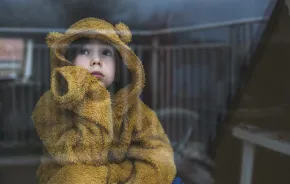
When your child misses a milestone, it feels like your star player has been sidelined for the season and all your plans are on hold. But there’s no need to stop in your tracks — you’ve simply turned on to a different path. The adventure is only beginning.
Delayed speech is a common issue that can cause a diverging developmental path. Up to 10 percent of preschool-age children will experience some form of speech impairment. The causes of these communication difficulties are as diverse as the expected outcomes. The misconceptions about speech delays seem to share much common ground, however. As a parent of an amazing human with an expressive-receptive language delay, I’d like to correct some of these assumptions.
Assumption no. 1: A speech delay means something really big is wrong.
Speech refers to the formed and spoken sounds we make, and language is the code for how we apply meaning and patterns to those sounds. There are any number of reasons why a child may have difficulty speaking or listening. Speech delays are caused by a combination of nature- and nurture-based determinants, and familial history or genetics are often contributing factors. Delving further into the underlying factors of speech delays may reveal that just one communication domain is impacted, while other areas remain unaffected or even demonstrate strength. For example, it is common to have higher receptive language skills than expressive language skills. A professional evaluation is required to understand if a speech delay is indicative of other conditions.
Assumption no. 2: Your parenting choices have caused this delay.
Understanding the exact cause of a developmental delay is still an objective of ongoing research. Because of this ambiguity, it’s easy for parents to blame themselves. But the root causes are likely not that cold-cut sandwich you ate during pregnancy or that extra movie your child watched last week. As you work to treat a delay, you’ll find that many strategies are employed: play-based therapy, speech therapy and even simple interactions. If resolving a delay were as simple as turning off the TV or eliminating sugar, speech therapists would not need to be so creative, have specialized degrees or work so hard to help our kids. (And I thank them for it. *)
Assumption no. 3: If I register my child as delayed, they’ll be labeled.
Okay, this assumption is technically true. You may get a diagnostic label, and you may get some additional tags in therapy, such as “needs visual cues to support spoken instructions.” But without early diagnosis and treatment, your child is at risk for receiving far worse labels: troublemaker, dumb, slow or lazy.
Assumption no. 4: They’ll grow out of it on their own.
Untreated speech disorders can have significant and lifelong impacts, including behavioral challenges, mental health problems, reading difficulties and the potential for other academic struggles. Even mild disorders can engender an aversion to reading and academics, as well as lead to habits that are scholastically detrimental early on. If there is a concern about a speech delay, an evaluation by a skilled and professional speech-language pathologist (SLP) is needed.
Assumption no. 5: Delayed kids aren’t normal and can’t join in activities with others.
My child enjoys preschool with many typically developing peers as well as other children with delays. Sometimes he struggles with specific tasks, yet so do other preschoolers. Speech and language delays are not necessarily tied to intelligence or physical ability; in my son’s case, both are normal or higher. In fact, children with language-only delays can struggle to qualify for assistive services if they do not present with additional cognitive or occupational issues.
Assumption no. 6: Your kid looks normal — they should have better manners.
Physical appearance does not reflect communication, adaptation, social-emotional skills or health. Observers may not be seeing the whole story. One day at a restaurant play space (before the pandemic), a younger child kept throwing toy trains and tracks while my child quietly dodged them and the other child’s mom chatted away with her friends. After the sixth time of having a track thrown at him, my much taller child grabbed the projectile away. My son knows not to throw things that could hurt people, but not how to explain that with words, so he tried his best. All the other child’s mom saw was him grabbing the track away and she yelled at him.
Assumption no. 7: Bribery is an excuse used by lazy parents.
Complex and abstract concepts are difficult to bridge without the right language. So, yes, I’ve been known to resort to screen time or chocolates to avoid a public meltdown. The same people who would judge me for this are also the ones who would judge me for the meltdowns.
Assumption no. 8: Speech delays create quiet children.
Speech and language are not the only sounds in our lives. Though we are lacking words, we are not lacking noise, laughter or delighted screams at our house. Add that to music, videos, banging blocks, clanging trains and scary “monsters.” It’s not quiet around here!
Assumption no. 9: Without words, my kid won’t be understood by anyone.
First, most delayed children will develop at least some speech, and many children will develop full capability in speech and language over time. Second, communication is not limited to words, but includes gestures, facial expressions, actions and more. Third, there are assistive devices and practices for children who need them, such as the Picture Exchange Communication System (PECS). Furthermore, in a child’s process of developing language, American Sign Language can be a great communication tool that will not hinder the development of verbal language acquisition.
Assumption no. 10: A developmental delay makes everything tougher.
Normally developing children can be trying, too. The terms “terrible twos,” “threenager” and “fournado” exist for a reason. Varying from the norm can cause difficulties, but these troubles are not the sum of our experience. There are benefits, too. My kid is becoming a master at charades; he could fully act the entire Teka and Moana fight scene from “Moana” before he was 2.
In the wise words of another ParentMap author, “We’re not victims of our children’s diagnoses, just as they aren’t a sum of them.” If your child’s development takes you down a different path, get the supplies and support you need to enjoy the adventure. There are upsides and downsides to every developmental journey, but understanding, not assuming, is the key.
*A special thanks for the editorial support from Anne Reeve, M.S., CCC-SLP and Trisha McGough, M.S., CCC-SLP.











